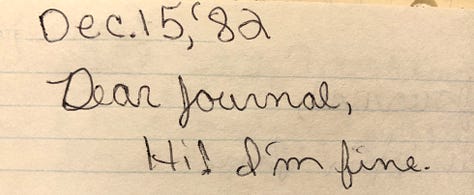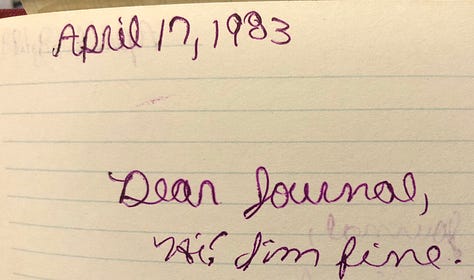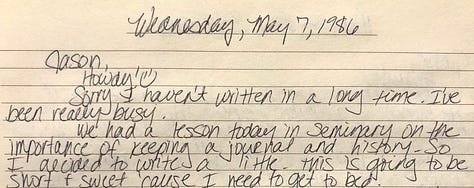In the journals of my youth, there are some repetitive patterns in the way I started each entry. In 1982-1983, I opened with, “Dear Journal, I’m fine.” Occasionally, an “I’m ok.” Over and over again. It’s so weird. Then I began the trend of apologizing at the beginning of about every third entry: “I’m sorry I haven’t written in a while.” I’m sorry I didn’t finish last time.” “I’m such a bad journal writer.” This went on for quite a few years.
In that spirit, since I haven’t written here in a while, I just want to say to you all, “I’m fine.” But it is taking all of my strength NOT to apologize for not writing sooner. =)









The end of the 2021 school year was weird. I think in April the schools finally reopened, but with a hybrid model - part online, part in school. Aster was relieved to be back among their peers. The pandemic isolation really affected my kids socially and emotionally, Aster especially. It was so hard to see them struggle with depression, anxiety and fatigue. I felt helpless for them. They were due to graduate on June 12th, but were so behind on some assignments that we had to work with them daily to make sure they completed all the requirements for graduation. But they made it and I was so proud of Aster. Knowing how hard school was for them made graduation even more special. We celebrated by going out to sushi as a family, and promised Aster a road trip to the desert as a graduation present, planned for December. And then encouraged Aster to rest that summer.
As for my relationship with the church, my testimony was wavering, as they say.
In our church, having a testimony is everything. It is the most important thing. Having a testimony means that you have prayed about the teachings, the Book of Mormon, Joseph Smith and you feel that they are all “true” - divinely inspired - but not just divinely inspired, - the only complete religious truth upon the whole earth. Having a testimony means knowing that God is our loving Father in Heaven and that Jesus Christ is our Savior. It also means that you know that the president of the church, his counselors and the Quorum of the Twelve Apostles are prophets, seers and revelators and the only people on earth that have the full keys and authority of the priesthood.
Having a strong, unwavering testimony is so important that you are asked if you believe in the major tenets of the church doctrine in a temple worthiness interview with one of the men in the bishopric.
President Gordon B. Hinckley described testimony beautifully:
It is a mysterious and wonderful thing, a gift from God to man. It overrides wealth or poverty when one is called to serve. This testimony which is carried in the hearts of our people motivates to an impelling duty. It is found in young and old. It is found in the seminary student, in the missionary, in the bishop and the stake president, in the mission president, in the Relief Society sister, in every General Authority. It is heard from those who hold no office other than membership. It is of the very essence of this work. It is what is moving the work of the Lord forward across the world. It impels to action. It demands that we do what we are asked to do. It brings with it the assurance that life is purposeful, that some things are of far greater importance than others, that we are on an eternal journey, that we are answerable unto God.
Wherever the Church is organized its power is felt. We stand on our feet and say that we know. We say it until it almost appears to be monotonous. We say it because we do not know what else to say. The simple fact is that we do know that God lives, that Jesus is the Christ, and that this is their cause and their kingdom. The words are simple, the expression comes from the heart. It is at work wherever the Church is organized, wherever there are missionaries teaching the gospel, wherever there are members sharing their faith.
This witness, this testimony, can be the most precious of all the gifts of God. It is a heavenly bestowal when there is the right effort. It is the opportunity, it is the responsibility of every man and woman in this Church to obtain within himself or herself a conviction of the truth of this great latter-day work and of those who stand at its head, even the living God and the Lord Jesus Christ.
Gordon B. Hinckley
I’m curious about when knowing things for sure became so important in the church. Has it always been this way? When did fast and testimony meetings begin? When did the temple recommend questions become a requirement in order to enter the temple?
Is saying “I believe” or “I hope” enough? Enough to prove my worth or have the Spirit with me? Can we really know? What if I don’t know? Why is it so important to say “I know?”
We are taught in the church that knowing will keep you safe from the evils of the world. Having a strong knowing testimony will keep you in the church. Knowing will help you to be strong in times of trial. Knowing will help you not be thrown around on a storm-tossed sea. Having a strong testimony is how you stay close to God.
So if my testimony “wavers,” can I still have a relationship with God? Can you ‘know’ that Jesus has got your back but not ‘know’ that the current president of the church is the only human on earth authorized to act in his name?
For enduring peace and security, at some time in life, in quiet moments of reflection, you must come to know with a surety that there is a God in heaven who loves you, that He is in control and will help you. That conviction is the core of strong testimony.
Elder Richard G. Scott 2001
We were taught as missionaries that our testimonies grow stronger by the bearing of them. If you weren’t really sure if Joseph Smith was a prophet, say that you know he was, then you will know. I did that a few times. Sometimes I felt the truth in that, and sometimes I felt nothing. It was strange.
For years I worried that bearing my testimony, especially to a less active or non-Mormon, really came across as “I’m better than you.” “I know. And poor you, you don’t know.” “I’m one of the elect, so I get to know, and you don’t.” “But also God loves you." I don’t know if I ever came across that way. The possibility of being condescending to someone makes me cringe.
Having a testimony is so important, being able to say “I know” is so important, that we reserve one Sunday each month for Fast and Testimony meeting, where anyone from the congregation is encouraged to come to the pulpit and bear their testimony - share their beliefs about Jesus, the truthfulness of the church and gospel, and the occasional oversharing about their travels, medical issues and personal family matters.
For the most part, I have always enjoyed testimony meetings. Many people get up to the pulpit and start with “I’d like to bear my testimony that I know the church is true.” It really is a sweet way to start sharing your “knowing”. Throughout my life, I have felt the spirit of God countless times when friends, leaders, ward members and strangers have shared their testimony. I think part of feeling the spirit there is because it is a tender thing when someone shares their innermost thoughts and beliefs. But also, I gained strength from their knowing, their testimony of the church. I relied on their testimony. And the spirit was telling me in my heart that what they were saying was true.
My parents bore their testimony often. I thought, “well if they know, then I am on the right path, and I’ll believe it too.” They expressed how much they loved the Savior and how much love they had for their family. A brief look into the windows of their soul. I always admired them for their strong testimonies and belief in the church.
Like many members, before I share my testimony, I feel a nervous tension build up inside of me, my heart burning, as the spirit urges me to go up to the pulpit, and share my testimony. It’s a powerful feeling.
Some people cry when sharing their testimony, some don’t. Some people start to cry and take off their glasses because they can’t see through the tears. Like me and my mom.
There is something about that sobbing at the pulpit when I was a youth. I really think that I did that because I had so much emotional pain trapped inside of me, that even cracking open the deepest parts of me, my testimony, caused me to release a bunch of pent up pain and unprocessed trauma. I mean, my goodness, I loved the church and God, but I was not sobbing because of that belief.
Here is a journal entry about how nervous I was about bearing my testimony and being embarrassed about crying.
I cannot recall a specific incident in which I first gained my own testimony. Instead, my testimony was built through many different experiences and feelings throughout my life.
I wrote my testimony in my journal for the first time when I was 12 years old.
“I feel that Jesus is very important. He is the most important person in my life. He helps me do the right things. I love to learn about him because he is so important. I'm glad that he died for us on the cross to save us from our sins. He suffered so much and is a great example for me. What can I do to serve him? I can do missionary work to make converts to his church. I can pray to my Heavenly Father every day. I can follow Heavenly Father’s commandments. I can be nice to my friends and family. I can read the scriptures.”
When I was around 14 years old, I remember really wanting to know if what I was taught was really true, but mostly I was struggling with my self worth and a disconnection with God because of my depression. I knelt by my bed and asked God if He was really there and if he loved me. I felt a gentle warmth around me and a reassurance that he knew me and loved me.
Journal entry: Age 21 at BYU
Today was a pretty good day. Church went well, as usual, and I got the spiritual lift I needed. It was fast and testimony meeting. I bore my testimony in Relief Society, and I felt really good about that, since I don’t bear my testimony very often. I just expressed my thankfulness for the gospel in my life. I also expressed my love for my family and how good they are to me. Of course I cried the second I got up there, but I got through it, and felt much better afterwards.
Journal entry: July 1993, Age 21
All I know is that the gospel is true, the Book of Mormon is the word of God, and Joseph Smith saw the Father and the Son. My testimony is simple, but very important.
Journal entry: February 1999, Age 28
I read this passage in the book of Mormon (Alma 33: 3-11), which really impressed me. It was a reminder that the Lord truly hears my prayers, and will be merciful to me and answer in his own way. I have had many tearful prayers and pleadings on my knees in the past few months, and I know He hears me.
Journal entry: October 2008, Age 37
I am thankful for the Atonement of Jesus Christ. I don’t have a perfect understanding of the Atonement and sometimes my faith feels weak, but I am trying to have faith - faith in my church leaders and their testimonies, faith in Jesus Christ and the miracle of the Atonement - that it can cleanse me strengthen me, and help me to become the woman I am meant to be.
It’s sweet to read those things that I wrote in my journal. I really marvel how much faith I had in God despite my challenges in life. I tried so very hard.
One thing is for sure, that according to our leaders, fear, uncertainty and doubt are testimony killers. Uncertainty and doubt happen because:
You have committed lots of sins
You have been listening to anti-Mormons
You haven’t sufficiently strengthened your testimony with perfect obedience
You obviously just don’t have enough faith
You are a lazy learner
Besides having sex outside of marriage, it’s the worst thing that can happen to you.
Faith and fear cannot coexist. One gives way to the other. The simple fact is we all need to constantly build faith and overcome sources of destructive disbelief.
Elder Neil L. Andersen (October 2008)
Doubt is a negative emotion related to fear. It comes from a lack of confidence in one’s self or abilities. It is inconsistent with our divine identity as children of God.
By Elder Kevin W. Pearson Of the Seventy (April 2009)
I don’t agree with this. I think faith and doubt and belief and fear are all just a part of a spiritual journey. I don’t think fear is automatically an indicator of a lack of faith. Fear is not from the adversary.
The leaders teach that fear and doubt come into your heart for a variety of reasons, but never because life just happens and it’s normal to have ups and downs and discoveries and losses and rediscoveries. Maybe it’s more advantageous for a church to call waves of belief and disbelief as an influence from the adversary, because it keeps people in the church. Make people terrified of their own humanness, tell them that only the church has the answers, and they will stay in the boat. I’m not saying that all church leaders purposely manipulate that way. It’s just a thought.
I remember growing up that we were taught that if we aren’t completely solid in our testimony, we will end up in the Nephite cycle of obedience and belief > prospering > pride > bad things like famine and war > humility before God and praying for relief. And repeat.
I was terrified of that.
I wonder if other members who have scrupulosity tendencies are so scared of ups and downs in their testimonies, that they can get hyper vigilant and over think everything, like I have. There comes a great deal of shame and guilt for even thinking you have slightly wavered from the fold and from “knowing”. One day of missing journal writing and I’ve got to repent.
But what happens to testimony when religious trauma and conflict come into the picture? It’s deeply unmooring. It’s scary. It has caused me to question everything I believed in. I was taught what to believe in by the leaders of the church, so when my major conflict with the leaders’ teachings came, I wondered then, is what I have been taught by them true? Are they right about all this even though lately so many things don’t feel right? Everything was knocked down to the foundation. To the very basics of testimony.
Does God exist? Is He the kind of being that I have been taught that He is? Does He hear my prayers? Does He want me to be perfect?
I don’t remember where my testimony was in the summer of 2021. I loved the church, I believed in God and Jesus, but there was so much spiritual conflict in my soul. It was both painful and fascinating. I was constantly pleading with God to help me.
Is this spiritual unraveling really a faltering of my testimony? Is it really due to my lack of faith and desire to sin? Is it a punishment from God, as Righteous Rachel tends to think?
Is it possible that I am exactly where I need to be on my spiritual path?
I have been hanging on to my faith for dear life, and yet, here I am.
Now that I cannot say “I know” about a lot of church things anymore, what does that say about the strong testimony I once had? I don’t feel like that testimony was false or fake or insincere. I truly believed in everything the church taught. I don’t remember ever questioning anything. There was something about that strong belief that anchored me, that helped me feel secure, and I am grateful for it.
I keep hanging on to the things I believe in. About the only things I know for sure are what love feels like and what pain feels like. I believe that there is a God who is aware of me and loves me. Everything else? I don’t know. And I’m not sure if it matters that I don’t know that everything in the church is true. Maybe someday I'll get back to believing in all of it, maybe I won’t.
I don’t know.




